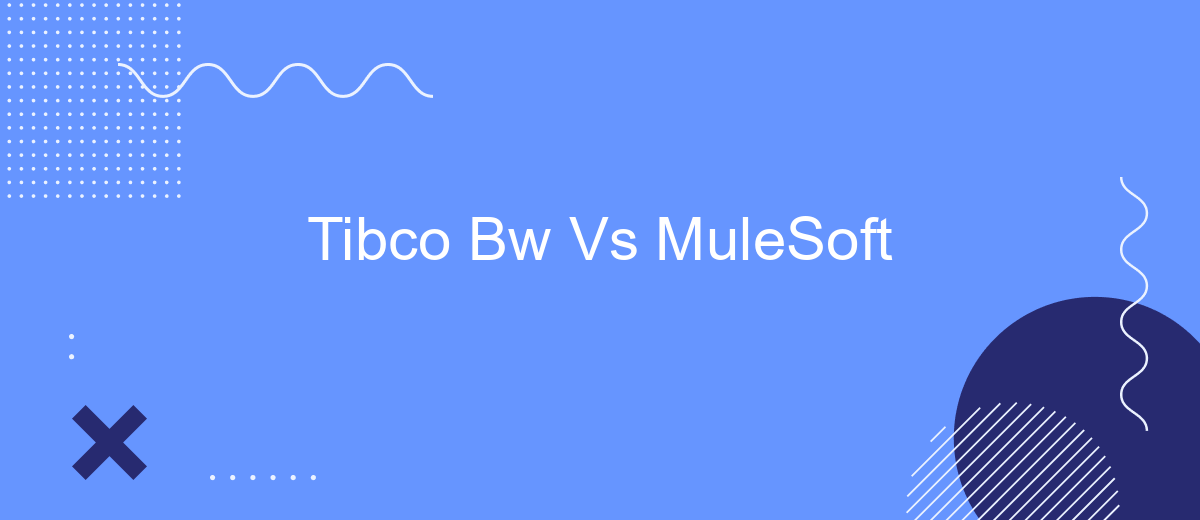When it comes to enterprise integration platforms, Tibco BusinessWorks (BW) and MuleSoft stand out as two of the leading solutions. Both offer robust features for connecting applications, data, and devices across various environments. This article delves into a head-to-head comparison of Tibco BW and MuleSoft, examining their key functionalities, strengths, and potential drawbacks to help you make an informed decision.
Introduction
In the fast-evolving world of enterprise integration, choosing the right tool to streamline your business processes is crucial. Two prominent players in this field are Tibco BusinessWorks (BW) and MuleSoft. Both platforms offer robust solutions for integrating various systems, applications, and services, but they differ in their approach, features, and ease of use.
- Tibco BW provides a comprehensive suite for enterprise integration, focusing on scalability and reliability.
- MuleSoft, on the other hand, emphasizes flexibility and ease of use with its Anypoint Platform.
- Both solutions support a wide range of integration patterns and protocols, making them versatile choices for businesses of all sizes.
Understanding the strengths and weaknesses of each platform is essential for making an informed decision. While Tibco BW is known for its robust enterprise capabilities, MuleSoft's user-friendly interface and extensive connector library offer a different set of advantages. Additionally, services like SaveMyLeads can further simplify the integration process by automating data transfers between various applications, enhancing the overall efficiency of your integration strategy.
Comparison of Features

Tibco BW and MuleSoft are both prominent integration platforms, but they cater to different needs and use cases. Tibco BW, known for its robust enterprise-level capabilities, offers extensive support for various protocols and complex integration scenarios. It provides a visual interface for designing workflows and is well-suited for organizations with intricate and large-scale integration requirements. MuleSoft, on the other hand, is renowned for its API-led connectivity approach, making it ideal for businesses looking to build a network of applications, data, and devices through APIs. Its Anypoint Platform simplifies the process of designing, deploying, and managing APIs, which is crucial for modern digital transformation efforts.
Both platforms offer extensive out-of-the-box connectors, but MuleSoft's marketplace, Anypoint Exchange, provides a broader range of pre-built connectors and templates, accelerating the integration process. Tibco BW excels in real-time data processing and complex event processing, making it a preferred choice for financial services and telecommunications. For businesses seeking to streamline their integration setup, services like SaveMyLeads can be beneficial. SaveMyLeads automates the process of connecting various applications and services, reducing the manual effort required and ensuring seamless data flow across systems. This can complement the capabilities of both Tibco BW and MuleSoft, depending on the specific integration needs.
Pricing Models and Licensing

When comparing the pricing models and licensing of Tibco BW and MuleSoft, it's essential to consider the different approaches each platform takes to cater to various business needs.
- Tibco BW: Tibco BW offers a subscription-based model, which includes different tiers based on the number of applications and the volume of data processed. This model allows businesses to scale their usage and costs according to their growth and integration needs.
- MuleSoft: MuleSoft also operates on a subscription basis but provides more granular control over pricing through its API-led connectivity approach. Pricing is influenced by the number of APIs, the number of users, and the deployment options (cloud, on-premises, or hybrid).
Both platforms offer robust solutions for integration, but the choice may depend on specific business requirements and budget constraints. For businesses looking to streamline their integration processes with a specialized service, SaveMyLeads can be a valuable addition, offering automated workflows and seamless data transfer between various applications.
Pros and Cons

When comparing Tibco BW and MuleSoft, it's essential to consider their respective strengths and weaknesses. Both platforms offer robust integration solutions, but they cater to different needs and preferences.
Tibco BW is known for its strong enterprise capabilities, making it a popular choice for large-scale organizations. MuleSoft, on the other hand, excels in providing a flexible and developer-friendly environment, suitable for a wide range of businesses.
- Tibco BW Pros: High scalability, strong enterprise features, and comprehensive support.
- Tibco BW Cons: Higher cost, steeper learning curve, and more complex setup.
- MuleSoft Pros: User-friendly, flexible, and cost-effective for small to medium businesses.
- MuleSoft Cons: Limited enterprise features compared to Tibco BW, and may require additional tools for specific integrations.
For businesses looking to simplify their integration processes, services like SaveMyLeads can be beneficial. SaveMyLeads offers a user-friendly platform for automating lead management and integrating various services, helping companies streamline their operations without extensive technical expertise.
Conclusion
In conclusion, both Tibco BW and MuleSoft offer robust solutions for enterprise integration, each with its own set of strengths and unique features. Tibco BW excels in providing a powerful and mature platform with extensive support for complex integration scenarios. Its strong emphasis on reliability and scalability makes it a preferred choice for large enterprises with intricate system landscapes.
On the other hand, MuleSoft stands out with its API-led connectivity approach, promoting reusability and agility. Its user-friendly interface and wide range of connectors make it an excellent choice for businesses seeking rapid integration deployment. Additionally, services like SaveMyLeads can further enhance the integration process by automating lead management, thus saving time and resources. Ultimately, the choice between Tibco BW and MuleSoft should be guided by specific business needs, existing infrastructure, and long-term integration goals.
FAQ
What are the primary differences between Tibco BW and MuleSoft?
Which platform is more suitable for large-scale enterprise integrations?
How do Tibco BW and MuleSoft handle API management?
Is there a steep learning curve for either Tibco BW or MuleSoft?
Can I use third-party services to assist with the implementation of Tibco BW or MuleSoft?
Don't waste another minute manually transferring leads from Facebook to other systems. SaveMyLeads is a simple and effective tool that will allow you to automate this process so that you don't have to spend time on the routine. Try SaveMyLeads features, make sure that this tool will relieve your employees and after 5 minutes of settings your business will start working faster.
